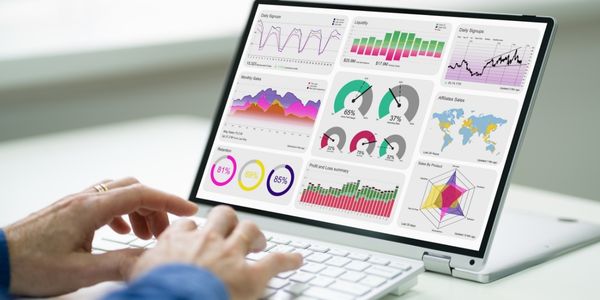
If you’ve been thinking about a career upgrade, it’s hard not to turn your eyes to the future—and the technology-focused careers fueling change across industries. The information age has provided job seekers with a variety of intriguing and potentially lucrative career options to consider. Working as a data analyst can be an especially eye-catching option as more and more organizations turn to data analysis for their decision-making.
While the general idea of processing data in order to help with decision-making sounds appealing, you need more than a simple summary to determine if a data analyst career might be right for you. What’s enjoyable about the work of a data analyst? Do certain traits or personalities lend themselves to this type of work? How do I know if I’d like working as a data analyst?
To answer your questions, you need something every data analyst needs—data! We spoke to real-life data analysts who shared their insights on what this career is like from within. Take a look at some essential details about this role to help you make a more informed analysis. Wondering “is data analyst a good career?” explore this additional blog for a deeper dive.
6 Questions every could-be data analyst should ask themselves
1. Do I like research?
If you aren’t a fan of diving into information and further exploring the subjects you’ll be asked to analyze, life as a data analyst probably isn’t for you. Surface-level information can often be misleading, so having a drive to dig in a little further to better understand the data you’re working with is key. Eric Ratowski, a data analyst at Fox World Travel, says data analysts need to make research a constant. “People look to data analysts as experts and look for recommendations based off what the data is showing—so it’s important to stay up to date with trends and other happenings with the company.”
Pulling data from new sources can also take a great deal of research, according to Ratowski, especially since data analysts need to be sure the information they gather is accurate and taken with proper context.
2. Am I a clear communicator?
The core of a data analyst’s job is to take cold, hard numbers and transform them into a message or story that is meaningful to the organization. “Data is useless if those who need it can't understand it,” says Jerome Tennille, senior manager of impact analysis and assessment at a national nonprofit organization. “Regardless of what industry you're in, the way in which data is presented will be a key factor in how it's received and understood.”
Ratowski says meeting with the stakeholders to share insights is a daily part of the job. “I make sure they understand what is being presented and meet with the other members of the team to solve various other problems and to improve on the solutions we already have,” he says. There’s a great deal of collaboration and communication involved.
3. Do I have an eye for detail?
Data can only help you make strategic decisions if it’s accurate, and that means constantly being on the lookout for seemingly small errors that can greatly skew an analysis. The data validation process takes up much of Ratowski’s time on the job. “Even one small error could take hours of work to figure out and correct.” He emphasizes that the data he presents must be correct and accurate to guide decision-making.
“Data quality issues can go unnoticed for a while and instantly render any finding useless,” says Marcus McCarthy, a business intelligence specialist for the University of Pennsylvania. “An analyst then needs to be 100 percent correct every time—a tall order that requires a meticulous mindset.”
If paying attention to the details doesn’t come naturally to you, data analysis might feel like an uphill battle since it really is a constant on the job. “Consistency is extremely important to gain trust and confidence with the people you are working with,” Ratowski says.
4. Do I enjoy analyzing how people think?
Interest in human psychology might not seem like an obvious skill for a data analyst, but understanding how people think can be a huge benefit in this career, according to Josh Braaten of Brandata.
“It helps us know which biases to avoid and be aware of in our analyses,” Braaten says. “It also helps us understand data better when we're better in touch with the human behavior that produces it.”
On top of that—a questioning mind can also push analysts to discover new processes or answers that had previously been unknown, according to Tennille. “Curiosity prods those in our field to continue to research and find that unknown.”
5. Can I stay organized?
“A well-organized workflow and working environment helps you become more effective in your job,” says Akos Boros, project manager at online analytics tool Capturly. “As a data analyst, when you work with tons of tables, [staying organized] will not just help you to do your job faster, but it will also make it smoother as well.”
6. Do I have the education, training or experience employers are looking for?
Last but certainly not least, you’ll want to consider how your resume currently stacks up if you’re thinking of making a move. While there’s certainly no set-in-stone “true” path to becoming a data analyst, there are some common preferences you should be aware of.
For one, you’re very likely going to need a Bachelor’s degree to compete with other candidates. Out of the over 80,000 data analyst job postings we examined in the last year, 85 percent preferred candidates with a Bachelor’s degree—and just over 4 percent preferred candidates with a Master’s degree or higher.1
Another factor you’ll want to consider is the level of experience employers are seeking in data analyst candidates. We found that 32 percent of job postings were seeking candidates with 0–2 years of experience, while 51 percent were seeking candidates with 3–5 years of experience.1 This shows there’s a good mix of junior data analyst roles and more advanced positions available. One piece of the “experience” puzzle that shouldn’t be overlooked is your overall familiarity with the industry you’re seeking a data analysis role in. For example, if you have experience in marketing operations, you’ve likely picked up on useful knowledge that can be carried over into an analyst role.
Is pursuing a data analyst career the right move for you?
If you weigh your responses to these questions, you should be closer to determining your interest and readiness for getting started as a data analyst.
Related Articles:
- 16 Data Analyst Skills Employers Love to See
- Data Analytics Examples: 9 Ways Businesses Are Channeling the Power of Data
1Burning-Glass.com (analysis of 81,726 data analyst job postings, Dec. 01, 2019 - Nov. 30, 2020)




